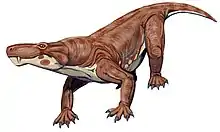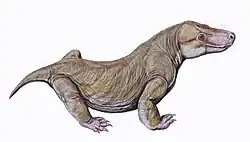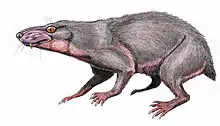| Mupashi Temporal range: | |
|---|---|
| Scientific classification | |
| Domain: | Eukaryota |
| Kingdom: | Animalia |
| Phylum: | Chordata |
| Clade: | Synapsida |
| Clade: | Therapsida |
| Clade: | †Therocephalia |
| Family: | †Karenitidae |
| Genus: | †Mupashi Huttenlocker & Sidor, 2016 |
| Type species | |
| †Mupashi migrator Huttenlocker & Sidor, 2016 | |
Mupashi is an extinct monotypic genus of therocephalians that lived during the Late Permian of what is now Zambia.[1] It was relatively small-bodied and had a long snout with a high tooth count compared to most other therocephalians. The size of its sclerotic ring suggests that it was adapted to be active in low-light conditions.
References
- ↑ Huttenlocker, A. K.; Sidor, C. A. (2016). "The first karenitid (Therapsida, Therocephalia) from the upper Permian of Gondwana and the biogeography of Permo-Triassic therocephalians". Journal of Vertebrate Paleontology. doi:10.1080/02724634.2016.1111897.
This article is issued from Wikipedia. The text is licensed under Creative Commons - Attribution - Sharealike. Additional terms may apply for the media files.




